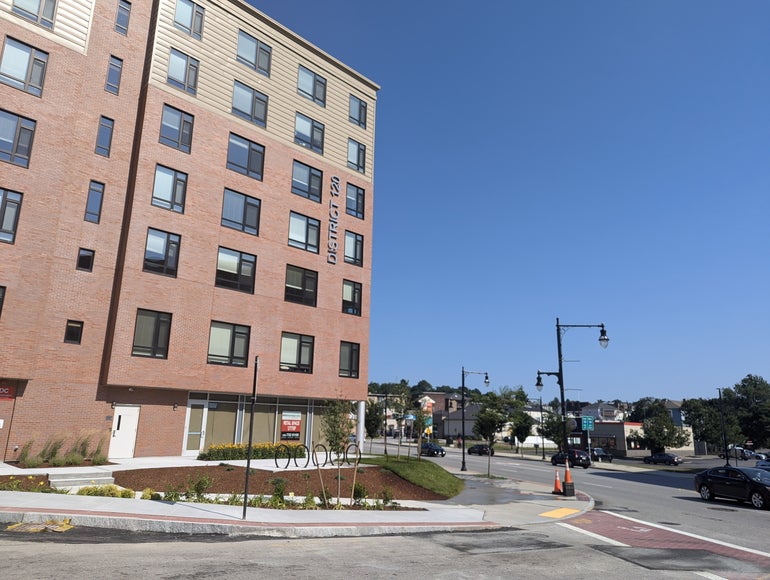The state will have to take “more muscular action” to facilitate construction of hundreds of thousands of new housing units in the next decade to meet demand, according to Congressman Jake Auchincloss.
During an address to the Charles River Chamber on Monday, he listed the high cost of housing as the “single biggest economic challenge” facing Massachusetts and encouraged more action to spur production.
Gov. Maura Healey has pointed to a goal of increasing the statewide supply of year-round housing by 222,000 units in the next decade. Auchincloss said the state would be short 250,000 units in the next ten years.
“We’re on pace to build probably 10% of that. So we’re not even trending in the right direction, actually,” he said.
The MBTA Communities Act, which requires cities and towns near MBTA service point to zone for multifamily housing, is an important tool to increase production, he said, as is a recent law to allow for accessory dwelling units by-right in all communities — but said there’s more the state needs to do.
“The state is also going to have to take more muscular action,” Auchincloss said.
“There’s a couple things that it could do,” he continued. “One, we’re very good as a government at subsidizing demand for housing. We’re less good at subsidizing the supply of housing. And the state now has the Momentum Fund, which is a way to offer no-interest and low-interest loans to developers who are building affordable housing. That’s a good start, and I applaud the governor for that. I think it should be expanded.”
The so-called Momentum Fund was part of a housing bond law signed last August. It’s a $50 million fund meant to provide flexible financing for mixed-income projects that are currently stalled.
The Newton Democrat also said the state needs to rezone brownfield sites for housing. These are abandoned properties previously used for industrial or commercial purposes. Some of them are not in use because of the potential presence of hazardous substances, and must undergo cleanup and redevelopment to be reused.
“There’s a decommissioned prison, there’s decommissioned military bases throughout Massachusetts that could be directly rezoned by the state and built, not hundreds, but thousands, or even tens of thousands of units of housing without going through direct local zoning,” Auchincloss said.
He also proposed a “nuclear option” of changing one of the state’s controversial affordable housing laws to boost production.
If at least 10% of a community’s housing stock is not considered “affordable,” Chapter 40B allows developers to bypass certain zoning requirements if a project includes a certain percentage of affordable units. Local zoning and planning boards often resist a full embrace of the law.
“The governor can unilaterally change Chapter 40B regulations about what the safe harbor limit is. And that would be a nuclear option, to be clear, but it would be the kind of stick that could galvanize more local action,” Auchincloss said.
According to the Citizens’ Housing & Planning Association’s Chapter 40B handbook for local zoning boards, there are certain statutory minimums set forth in the law — which, therefore, would require legislative action to change.
These include three ways a community can reach “safe harbor,” and ZBAs can then deny future affordable housing permits: at least 10% of their housing units are considered affordable under the most recent federal census, low or moderate-income housing exists on 1.5% or more of the municipality’s total land area, or a permit for a large construction project before the ZBA would increase affordable housing in one calendar year.
Though the governor could not unilaterally change those areas of the law, there are additional safe harbors created by regulation. The regulations are promulgated by the executive’s housing office.
Some of these regulations control how the housing department certifies that a community complies with its affordable housing production goals, defines “large” construction projects, and defines “recent progress” on compliance as meaning within the last 12 months, according to CHAPA.
Asked by a reporter Monday after both she and Auchincloss spoke at the Newton event whether she’d consider any new major housing initiatives this year, after the congressman called for more action, Healey pointed to last year’s housing bond law.
“We’re implementing the Affordable Homes Act right now. Excited to see more units coming online, and we’re just going to continue to find ways to bring more housing online,” she said.

